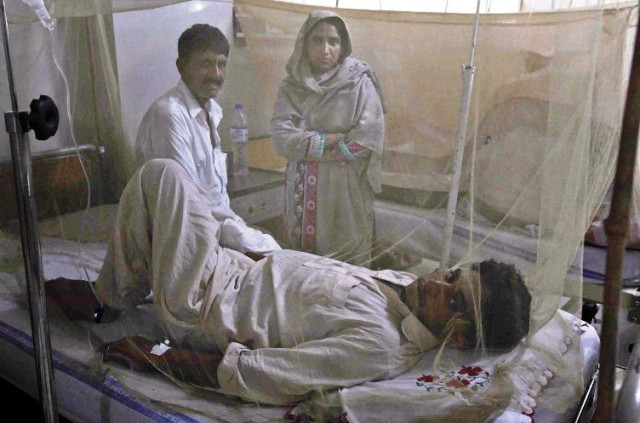With mosquitoes breeding as we speak, an outbreak may be imminent
Doctors fear dengue and malaria cases will rise in 2 to 3 weeks.

With most parts of rural Sindh inundated after the monsoon rains, doctors fear a spike in dengue and malaria in the coming days.
From August 27 to September 14, about 1,500 cases of malaria were confirmed while another 50,000 suspected cases were reported. A number of suspected cases, however, are of people showing symptoms of fever which are also telling signs of typhoid, viral infections or a urinary tract infection, according to Sindh Malaria Control Director Dr Nahid Jamali. From the beginning of 2011 till July, 6,000 cases have been reported in Sindh.
However, a doctor with a private practice believes that the method of calculating the number of cases is a bit suspicious. Speaking on the condition of anonymity, the doctor explained that, “the numbers seem to be quite low when you take into account the entire population of Sindh, a large chunk of which lives in the rural areas where this virus is dominant.” His dire prediction was that malaria cases will surge in the next two to three weeks and rural areas will be reporting the virus in huge numbers.
But the call for caution is not without reason. During the floods last year, about 47,000 cases of malaria were reported. The incubation period of malaria mosquito is 14 days. It has been a little over a week since the monsoons ravaged Sindh. Now, with water stagnant in most areas, doctors fear the disease will soon begin spreading if measures are not taken to clear the water. Still, Dr Jamali feels there is no reason to panic.
“We are receiving cases on a regular basis but the numbers are not that high yet. If we get more than five cases from a particular area, we send out our team to investigate and administer treatment to suspected cases,” he said. “We are equipped with rapid diagnostic kits which can confirm whether or not a person has malaria within 20 minutes. If an outbreak hits Sindh we are ready.”
Malaria, like dengue, peaks in October and November and dips when the weather turns cold in December. As malaria is more prevalent in the rural areas, the number of cases may not be diagnosed or reported accurately, said the doctor. “Many people in the countryside do not have a proper diagnostic system. Thus, a large number of cases may not even be reported or recorded.”
As for dengue, the doctor was less positive. “Karachi will be hit with dengue just like Punjab has been. Lahore is two-thirds the size of Karachi and, with the rains compounding the situation, the city needs to be prepared.”
Dengue is an urban virus while malaria is predominately a rural one which is another reason why the method of reporting cases differs for both. All government and private hospitals and clinics are supposed to provide daily dengue reports. It is unclear whether the same pattern of reporting is followed for malaria.
Published in The Express Tribune, September 16th, 2011.



















COMMENTS
Comments are moderated and generally will be posted if they are on-topic and not abusive.
For more information, please see our Comments FAQ